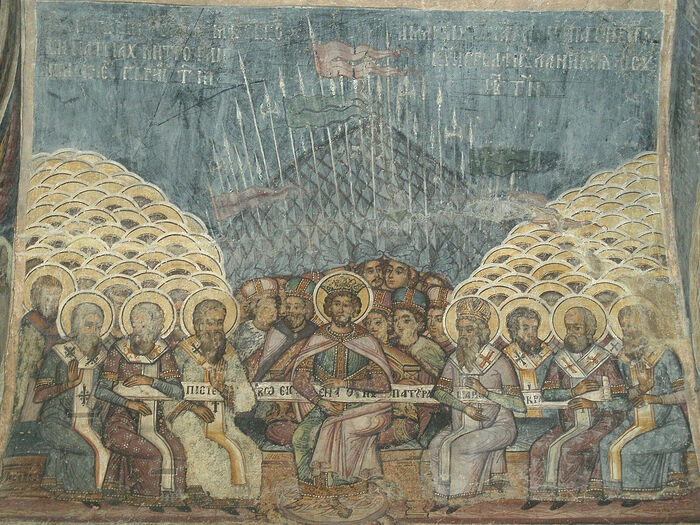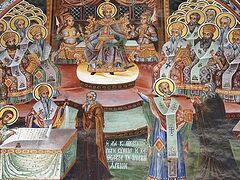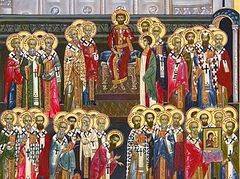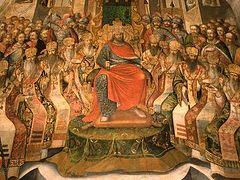 First Ecumenical Council. Fresco, 18th c. Stavropol Monastery, Bucharest, Romania
First Ecumenical Council. Fresco, 18th c. Stavropol Monastery, Bucharest, Romania
Having celebrated Christ’s saving Ascension, we find ourselves one Sunday before the Feast of Holy Pentecost. The Holy Fathers ordained that on this, the Seventh Sunday after Pascha, a commemoration should be held of the Fathers who gathered at the First Ecumenical Council in Nicea, in the year 325. The Church experienced wave upon wave of relentless and fierce persecutions in the first centuries of its existence. During these times, being a Christian was a life-risk: Death awaited you at any moment. Christianity grew as a result of these persecutions. By the early 300’s, a significant portion of the Roman Empire’s population had embraced the Truth of Christ, having witnessed the Faith displayed in the martyrs’ courage. The Edict of Milan—otherwise known as the Edict of Toleration—issued in 318, signaled the end of the persecutions. Now, everyone in the Empire—Christian or Pagan or Jew— was free to worship according to his or her conscious without threat. Pagans were not persecuted, naturally, and Jews were tolerated due the perceived historicity of their faith.
The time was not ripe until the reign of Emperor Theodosius to declare Orthodoxy the solely tolerated faith of the Empire—hence, the Edict of Milan emphasized the equality of all before the Roman State. The power balance did not allow for a deceleration of the Church’s de-facto prevalence and superiority. However, by 318 Christianity was the favored Faith of the Empire’s polity. Emperor Constantine—the first Emperor to become a Christian himself—favored the Church and consistently worked to undermine pagan influences in the Empire. Constantine’s translation of the capital from Rome to New Rome—Constantinople—was one such effort to remove pagan influence by creating a new, Christian capital, free of paganism. The persecutions wrought many martyrs; the glory of the martyrs—their spilled blood —became the Church’s seed, as the popular saying went. The Lord willed that the peace and security felt by the Church would not be long-lasting. This is due to the fact that times of peace, for the Church, are extremely counter-productive. They are seemingly productive on the surface: Churches can exist in freedom and even benefit from the favor of the State. However, real Faith is established and grows in the face of adversity. The Church was about to live such an adverse situation with the advent of a new, heretical teaching called Arianism.
Arius was an Orthodox Christian presbyter serving the Church of Alexandria. At the time, the Church of Alexandria and the Church of Antioch were the epicenters of Christian theological thinking in the East. Our purpose here is to not delve into the details of the controversies those theological schools faced in their time. Suffice it to say that Arius began teaching a new doctrine, that there was a time when the Son was not. Arius confessed that Christ was a son of God the Father, the Angel of Great Council, created slightly before the angels were created—yet nonetheless, created and not of the same essence with the Father. This heretical teaching meant that Christ was not God. And if He is not God, how can He save man? This is the central controversy wrought by Arianism. The Fathers gathered at Nicea after this heresy greatly disturbed the peace of the Churches. Emperor Constantine and 318 Fathers assembled there, and the teachings of Arianism were condemned as heresy.
The Nicean Creed, otherwise known as The Symbol of Faith, was composed there, at what came to be known as the First Ecumenical Council. While other Creeds did exist before Nicea, this new Symbol was meant to be the Church’s official statement of belief. While rites differed from country to country and even province to province throughout the Empire, worship contained some constants—and one of these was the Creed. The Fathers at Nicea recognized the need of having an easily memorized text which could be recognized from Great Britain to Constantinople and over to Syria and down into Egypt and Ethiopia and beyond as the standard of the Christian Faith. The Creed clearly combats Arianism; the Son is confessed to be: One Lord Jesus Christ, THE Son of the Father, begotten of the Father BEFORE All Ages. Furthermore, He is Light of Light, True God of True God, Begotten NOT made, of ONE Essence with the Father, by WHOM all things were made.
This portion of the Creed was inspired by a specific event which took place at the First Ecumenical Council—the miracle by the prayers of St. Spyridon, the Bishop of Trymithous in Cyprus. Wanting to demonstrate that the Lord Jesus Christ is truly the Second Person of the Holy Trinity, incarnate for our sake’s—True God and True Man likewise—St. Spyridon took a brick and squeezed it saying, In the Name of the Father, and fire came out, And of the Son, and water came out, and of the Holy Spirit, and dust particles of hay came out. The three elements are in one brick, and so Three Persons are One God—as light comes from light so the Son is verily True God as the Father is verily True God. Yet other noteworthy confessions took place during the First Ecumenical Council, such as the defense of Orthodoxy by the young Deacon Athanasius, and the slapping of Arius himself by St. Nicholas the Wonderworker, Bishop of Myra in Lycia. St. Athanasius was awarded for his defense of Orthodoxy at the First Ecumenical Council by rapid promotion to the episcopal see of Alexandria upon his return. When Athanasius returned to Alexandria, the patriarch was on his deathbed. Upon his death, the people demanded that Athanasius take the See. The masses proclaimed to the episcopacy with one accord: “Give us Athanasius!”
The Victory of Orthodoxy at the First Ecumenical Council was, unfortunately, not long held. The imperial regime and the various Machiavellian factions operating the power structures of the Empire could not ignore the influence of Arianism. Soon, Arianism overtook the Empire and rapidly spread—despite the initial triumph of the Orthodox Faith. Eusebius of Nikomedia was a key Arian bishop who managed to oppose Orthodoxy. Eusebius orchestrated St. Athanasius’ deposition from sacred orders and subsequent exile from his Patriarchal See. The heretic Eusebius initiated what was the first of five exiles for St. Athanasius. The great and saintly hierarch Athanasius was so persecuted that in Rome a new saying was born: Athanasius Contra Mundi—Athanasius vs. the World. St. Athanasius spent his first exile in Germany, in Trier, and the subsequent exiles in Milan, in the monasteries of the Egyptian desert, and even in Thrace. Despite these persecutions and exiles, St. Athanasius managed to write extensively. Books such as The History of the Arians, Apology to Constance, On the Incarnation, Letter to the Monks, Apology for His Flight, etc., were all written around his third and fourth exile. St. Athanasius also interacted and benefited spiritually from his encounter and friendship with St. Anthony the Great, the Father of Monasticism. During this time period spent close to St. Anthony, St. Athanasius composed St. Anthony’s biography—The Life of Anthony—as an inheritance for future Christian generations. St. Athanasius continued to defend the Faith and was persecuted for his stance on these matters by Emperors Julian the Apostate and Valens who continued their predecessors’ policies in exiling St. Athanasius, as they called various false-councils to “reconcile” Orthodoxy to Arianism.
After one such council in Sirmia wherein a Sermian Creed was composed which mirrored the Nicean Creed, yet, subtly stated that the Lord was of similar essence with the Father, St. Jerome—another Holy Father of this era, said: “The world woke up to find itself Arian.” And in our time, the Church also faces a persecution. This is a subtle persecution. It does not exile you anywhere. Perhaps, it does not even confiscate your possessions or property or it does not cost you your job—though, perhaps, if you say the wrong thing and this is heard (or viewed online) by the wrong people, you might be cancelled. Banished to non- existence with all traces of you deleted in truly Orwellian fashion. This is much worse than any persecution that can be mustered up by any modern-day Julian the Apostate or Valens. Those men recognized you as a man and as a threat, yet these others will ensure that you become ignored and non-existent. What—I hear you ask me—what must I do to be granted such a fate? You must challenge the secular values this society holds dear. And challenge them in such a way that you annoy their stakeholders—much like St. Athanasius, who was a nuisance to the heretics of his era.
Beloved, while the Orthodox Faith today faces challenges internally, no force is as threatening to the existence of Christianity as that of a morally decedent Western society, which is beginning to “redefine” the morality that centuries of civilizations took to be obvious. Man blasphemed these norms. Furthermore, today, he is playing with the created order. And this, in terms of a judgment by God on the world, is a red line. The Fathers at Nicea were challenged to defend Orthodoxy. They defended the Faith, and it is by their defense and prayers that this Faith is transmitted to us today. Our challenge, in our own time and within our own society, is to reclaim our world for Christ, one soul at a time. And this reclamation begins right at home, in the family unit in which we encourage our boys to be men and our girls to be women—men and women who create Christian families which contribute to the growth of the Church and the support of the Orthodox Faith. Despite the challenges we face in our individual lives, we must come together as the Church in tight-knit, supportive communities/parishes in which the believers are grounded in Communion with Christ and with each other, sacrificing their time, their strength, their resources and their finances, and their energy for the glory of Christ and His Church. If the Fathers of the First Ecumenical Council (the physical wounds of the early persecutions were visible on many at the Council itself) could endure tortures and exiles for Christ, can we not sacrifice of our time and energy to build the Body of Christ?



